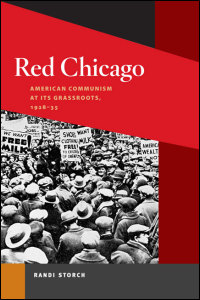Most mainstream newspapers and journalists are comfortable drawing connections between today’s financial crisis and the one we call the Great Depression. They also like to comment on the similarities between Obama’s “pragmatism” (and that of his cabinet picks) and the pragmatic economic policies and picks of Franklin Delano Roosevelt. With the release of Red Chicago in paperback, I too am thinking about comparisons between the 1930s and today. Unlike those who are absorbed with presidential politics and questionable Wall Street bailouts, I am closely following workers’ reaction to our troubling times.
Crisis in the auto industry and the closing of Chicago’s Republic Windows and Doors have been my two recent obsessions. In considering an auto bailout, several southern senators went on a full-on frontal assault against the UAW and organized labor, in essence blaming the unions for the industry’s current plight. In Chicago, Republic Windows and Doors employers thought they’d be able to close their plant without providing their unionized UE workers adequate notice or their appropriate and negotiated severance. Rather than take these knocks quietly, the UAW and Republic’s UE workers pushed back. UAW leaders are standing up to union bashing and the threat of give backs and UE workers skillfully and peacefully accomplished a sit in. While the auto situation is still in flux, Republic workers won their demands.
 In light of these developments, we may have more to compare between today and the 1930s. Franklin Delano Roosevelt’s policies and speeches convinced working people that they had the federal government’s support to organize labor unions. A flurry of labor activity and activism in industry throughout the country resulted. Of course, today’s times are different. Whereas Obama publicly supported Republic workers’ rights to what they had been promised, Republic workers fought over the conditions of their severance — not union recognition as workers had in the1930s. Today our manufacturing sector has been gutted and public unions are decidedly on the defensive. Yet these two signs of life among organized workers begs a larger question. Will the promise of Obama’s support for labor result in a resurgence of labor militancy? I for one, certainly hope so.
In light of these developments, we may have more to compare between today and the 1930s. Franklin Delano Roosevelt’s policies and speeches convinced working people that they had the federal government’s support to organize labor unions. A flurry of labor activity and activism in industry throughout the country resulted. Of course, today’s times are different. Whereas Obama publicly supported Republic workers’ rights to what they had been promised, Republic workers fought over the conditions of their severance — not union recognition as workers had in the1930s. Today our manufacturing sector has been gutted and public unions are decidedly on the defensive. Yet these two signs of life among organized workers begs a larger question. Will the promise of Obama’s support for labor result in a resurgence of labor militancy? I for one, certainly hope so.
*****
Randi Storch is an associate professor of history at the State University of New York College at Cortland and author of the newly available paperback Red Chicago: American Communism at Its Grassroots, 1928-35.
